| Short cuts : | Home | Contents | Photos | Ramblings | Contacts | Whats new | : : : | : : : |
As a great Archers addict, when I came across the Railway Detective book series in a charity shop, and thought I recognised the author Edward Marston as an Archers writer - I thought I would give the books a go. But I think I was probably confusing Edward Marston for the famous Edward J Mason, one of the founding Archers writers. However, on looking up Edward Marston - suprise, surprise - I discovered that he too is an Archers writer.
Edward Marston is one of several pseudonymns for Keith Miles. Keith is a most prolific writer, who writes under his own name, but also under several other pseudonyms - e.g. Martin Inigo, and Conrad Allen. Not only that, under each name he can also write several different series. Writing this introduction in June, 2013 I have counted at least nine series, and over 72 books published from 1978 and he is still writing. He seems able to complete four or five books per year. What a remarkable output ! As an aside, though, I later discovered that Marion Chesney (M C Beaton and other pen names) has written some 125 books, and is still writing !
Keith Miles was born in South Wales in 1940, and was also educated there. He graduated from Oxford University with a degree in modern history, lectured for three years, and then decided to become a full time writer, tackling children's books, radio and TV dramas such as The Archers, Crossroads, and Z-cars, and stage plays. He is a writer specialising in historical fiction and mystery novels. He was chairman of the Crime Writers Association for 1997-8, and married two mystery writers - Rosalind Miles was his first wife, and Judith Cutler, his second. Quite a life story, really.
Writing under his own name, his first series featured Alan Saxton , a professional golfer, and amateur detective. He then wrote the Merlin series. He adopted the pseudonym Edward Marston in 1988, and used that for most of his books. The Elizabethan Theatre historical series set in Elizabethan times, featured Nicholas Bracewell, a stage manager and amateur detective. The Domesday series featured Ralph Delchard and Gervase Bret, commissioners in the time of William the Conqueror. The Restoration series , set in 1660s/1670s London featured Christopher Redmayne, an architect, and Constable Jonathan Bale. The Captain Rawson series - a soldier and spy - was set in the period of the War of Spanish Succession. The Home Front Detective series was set in 1915, and featured Inspector Harvey Marmion and Segeant Joe Keedy. There were several other books as well. Writing as Conrad Allen he wrote the Dillman and Masefield series set on board ocean liners of the early 1900s and featuring private detectives George Porter Dillman and Genevieve Masefield.
But the series that concerns us here is the Edward Marston Railway Detective series set in the Victorian England in the 1850's when railways were being developed and featuring Scotland Yard detectives DI Robert Colbeck and Sergeant Victor Leeming.
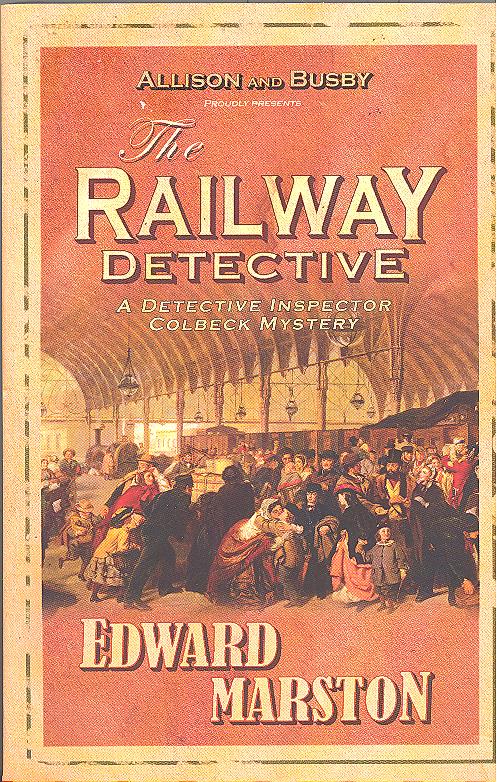
I read this book in July, 2013.
"The Railway Detective" is the first book in Edward Marston's historical crime series set in the 1850's, and featuring DI Robert Colbeck and Sergeant Victor Leeming of Scotland Yard. When I start reading a new crime series, I am always a bit anxious - will I like the new characters/ new writer ? Well, no problems here. I did like DI Colbeck, his assistant Victor Leeming, the officious, ex army D. Super Edward Tallis, and the assistant commissioner of the Met Richard Mayne. The book reminded me of the Erast Fandorin series, also set in the 19th century. I thought Edward Marston captured the life of the times of the 1850's perfectly. It was very interesting to read not just a good detective mystery, but also to read about the early days of Scotland Yard, the early days of the railways, and about the Great Exhibition.
The story starts with a train robbery - gold and cash are stolen, and bags of mail. The driver of the train, Caleb Andrews, beaten and coshed, is left in a bad way. The robbers seem very well organised, but before making off, they crash the train, and it soon becomes apparent that someone really hates the railways. Will Robert Colbeck catch the gang before more people are killed - a gang who seem to be saving themselves by killing all possible witnesses.
Colbeck is a trained lawyer who switched to become a policeman. He is in on the ground floor of the creation of a plain clothes detective division of the London police force. He is very clever and very able - in fact a lot more more able than his immediate boss Superintendent Tallis.
The book was well written, set the scene well, and introduced the characters. Robert Colbeck takes a shine to the beautiful Madeleine Andrews, the daughter of the injured train driver Caleb. This might be a future love interest in later books. 1850 courtship is very different to current day courtship, to say the least. But at the end of the book, Robert is to take Madeleine to the Great Exhibition, so all seems to be going well, if very slowly.
I liked the book, and I look forward to reading book two. There is lot about railways. Colbeck loves travelling by train, but his sergeant hates it. But the railway setting wasn't overdone - and I quite enjoyed it.
All in all, it's got the makings of a very interesting, slightly different series.
Links to author index and home page
| Edward Marston Heading | Author Index | Go to Home Page |
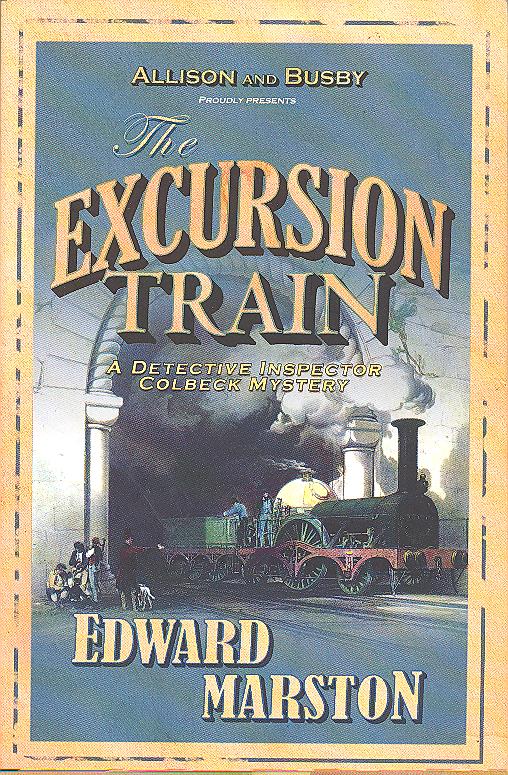
I read this book in July, 2013.
"The Excursion Train" is book two in the Railway Detective series by Edward Marston, featuring DI Robert Colbeck and Sgnt Victor Leeming of Scotland Yard, and set in the 1850's.
In book one, Robert had met Madeleine Andrews, daughter of the train driver Caleb, and had invited her to accompany him to the Great Exhibition. I had hoped that this might be the start of a love interest, but had expected the wooing to be a long drawn out process. Madeleine and Caleb reappear a few chapters in to the book, and Madeleine even gets the chance to help Robert investigate his latest case - sort of as a substitute female police officer, there being no such things in those days. By the end of the book, Robert has kissed Madeleine on the hand - so it's all looking promising.
It's well written, and it paints a realistic (I think) picture of live in the 1850's. It's a simple tale, but charmingly told, and I liked it.
What is the main plot ? A man is found murdered in a railway compartment on an excursion train taking the masses out of London to attend a bare knuckle boxing match. DI Colbeck solved the railway mystery of book one, so who else would be given to task of investigating this latest railway crime. It turns out that the murdered man is a part time, incompetent hangman by the name of Jacob Gutteridge. When he hanged Natham Hawkshaw, he had made a terrible mess of the business, and poor Natham died a slow, agonising death - it was almost torture, really. Natham had protested his innocence to the very end. Was it a miscarriage of justice, and did an innocent man die in agony? There were plenty of people who thought so. Was Gutteridge's murderer one of their number ? Superintendent Tallis wants this murder, and subsequent ones, solved, and solved quickly.
I like the characters, and the slow methodical pace of everything. We follow events as they unfold, and it's all very readable. I also like Boris Akunin, where the stories similarly tell the social history of their time. But the Boris Akunin stories take place mostly abroad - these ones are set at home. I think it's even more interesting to read of one's own history.
Links to author index and home page
| Edward Marston Heading | Author Index | Go to Home Page |

I read this book in October, 2013.
"The Railway Viaduct" is the third book in the Railway Detective series featuring DI Robert Colbeck and Sgnt Victor Leeming of Scotland Yard. It is set in 1852. It is quite a light series - I can't say I am enthralled by it, but it's quite pleasant "makes a change" reading.
All the usual characters are here. DI Colbeck's boss is Superintendent Edward Tallis, ex army, and Tallis doesn't really like Colbeck, but he's not above sharing in the limelight when Colbeck and Leeming solve another tricky case. Madeleine Andrews is back too, still helping Robert when asked, and their slow paced romance has now reached the stage where Robert kisses her on the lips. He gives her a gift at the end of the book, and says "if you think that this is a great present, wait to see what I intend to give you". Is he talking about an engagement ring, I wonder ?
The story is quite an interesting one, in keeping with the times. A french railway engineer is thrown from a train when it crosses the Sankey Viaduct in England. Colbeck and Leeming are given the case, and their enquiries take them to France whose railway system is less developed than the British one, but is being built by British engineers, and some 5,000 Irish navvies. There is also the re-appearance of Brendan Mulryne, a loveable rogue of an Irishman - a giant of a man with the strength to match. He is an ex- policeman, dismissed from the force for fighting - but a great ally in a fight.
Of course, the crime is solved in the end - but conveniently the man believed to be the mastermind behind the crime confesses. If he had kept quiet, I wonder, how could they have proved his involvement in the crime, in a court of law ? His confession seemed just a bit too easy a way out.
I thought the story started well, floundered a bit in the middle, but picked up again when Brendan Mulryne re-appeared. As I said at the start, it's a sort of OK series, not the world's best crime fiction, but I am quite enjoying it, and I'll read on.
Links to author index and home page
| Edward Marston Heading | Author Index | Go to Home Page |
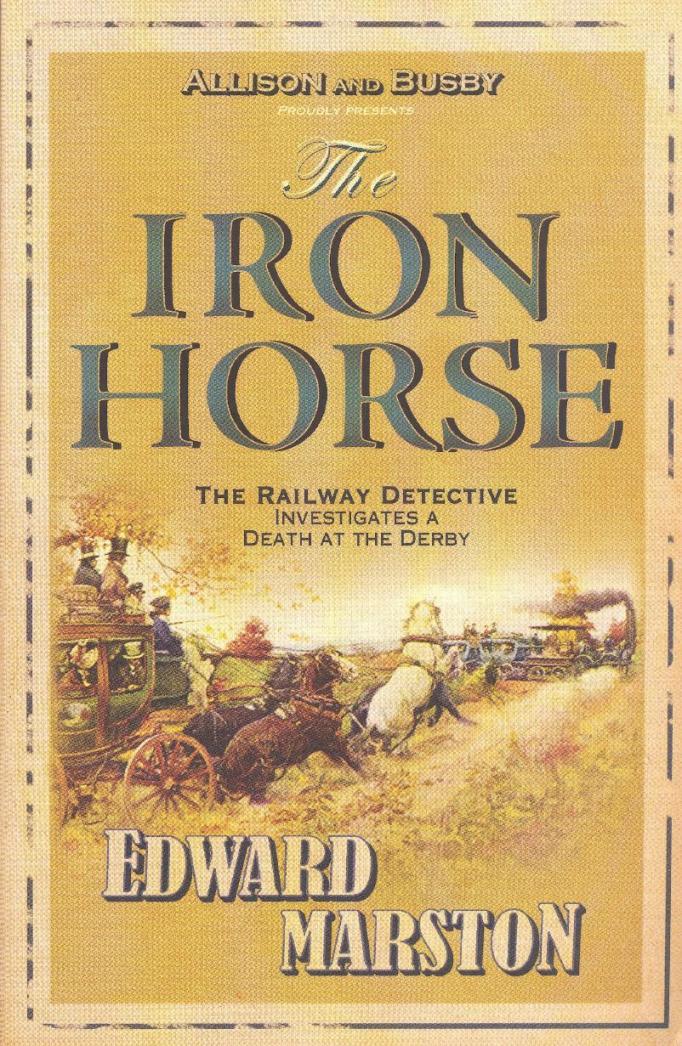
I read this book in December, 2013.
"The Iron Horse" is the fourth book in the Railway Detective series featuring Inspector Robert Colbeck and his assistant Sgnt Victor Leeming, and written by Edward Marston.
The story is set in 1854, and features The Derby, and the bitter rivalry of the three owners of the top fancied horses - Lord George Hendry, owner of the favourite Odysseus, Mr Brian Dowd, Irish owner of Limerick Lad, and the bookmaker Mr Hamilton Frido, owner of Merry Legs. The book opens with a railway porter dropping a hat box, out of which rolls a severed human head. Colbeck and Leeming are given to case to solve by Sup Edward Tallis. There is a lot of skulduggery about as each of the three owners goes flat out to win the money and glory attached to a Derby winner. Which of them is a murderer, or are they all as bad each other ?
Meanwhile the gentle courtship of Madeleine Andrews by Robert Colbeck continues at its usual slow pace.
I quite like these stories as a change from darker fare. Edward Marston seems to have done his research well enough, and we get what I think seems to be a fairly believable picture of life in the 1850's. One criticism though. Mr Marston seems to delight in writing in lists, and it's becomming a slight annoyance. When he says that the road is filled with vagabonds, he will add "and rogues, ne'er do wells,cut throats, thieves, ...." and so on with every synonym for vagabond that he can come up with. He uses such lists time and time again - is he trying to paint a better picture, or just pad out the narrative ?
All in all, I guess it's second division crime fiction - but it's different, I sort of like it, and I'll read on to see what happens next to Robert and Madeleine. Robert and Victor make a good team, and I am even getting used to Sup Tallis.
Links to author index and home page
| Edward Marston Heading | Author Index | Go to Home Page |
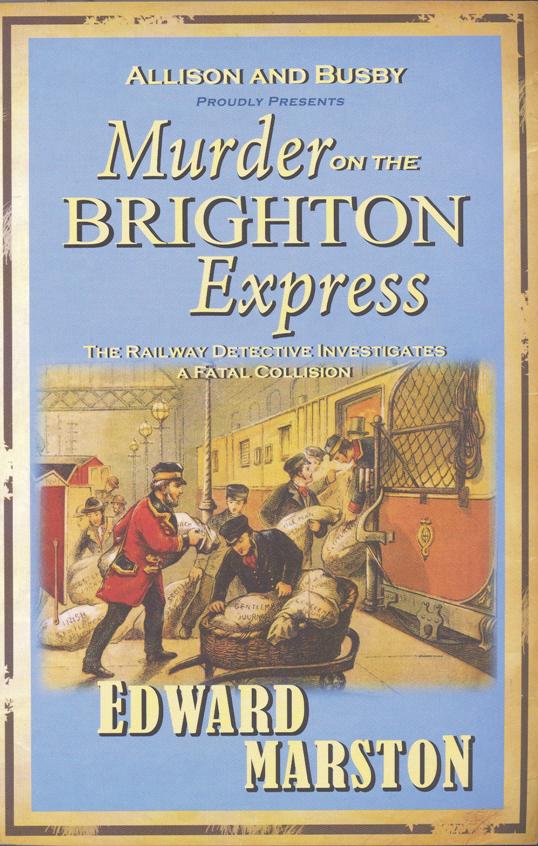
I read this book in January, 2014.
"Murder on the Brighton Express" is book five in the Railway Detective series featuring D. Inspector Robert Colbeck and his assistant D. Sgnt Victor Leeming, and written by Edward Marston. This book is set in 1854, so it's now some three years since Robert first met Madeleine in book one, and their very slow courtship continues. But, that said, it's hardly advanced at all in these three years. I think it's time they were at least engaged, if not married !
Part of the action of this book takes place in Brighton - yes, there is a clue in the title - and there is a nice touch in that the book is dedicated "to Peter James, my Brighton peer". I have been enjoying the Peter James books about D.Sup Roy Grace, also set in Brighton.
These Railway Detective books are very simple, easily read books, and I enjoy the stories. I think they give a good depiction of life in England in the 1850s. This book opens with the derailment of the Brighton Express. Colbeck is called in very early by the railway company, and on arriving at the scene of the disaster with his assistant Victor, is appalled at the carnage and the loss of life. Very soon he decides that the loose rail was deliberately detached - clashing with the chief inspector of railways who thinks it is simply a case of driver fault - the driver was going too fast.
The perpetrator seems to be someone with a grudge against the railways, perhaps making an attempt on the life of someone on the train. Clobeck and Leeming identify two possible targets. There are some nice twists in the plot, especially towards the end of the book. It's quite a nice, neat, well contained, and well told story. We also meet the Reverend Ezra Follis who was a passenger on the derailed express and who helped the injured. He later features in the story. Robert also mysteriously takes Madeleine to Brighton to meet the reverend. Why, she asks?
Sup Tallis, Robert's boss, is the same as before - but at least he backs up Robert and Victor when the railway chief inspector ( a fellow ex army man, like Tallis) calls into Scotland Yard to make a formal complaint.
The same newspapers who had praised the Railway Detective in earlier books, now side with the railway inspector, and print cruel cartoons about Robert seeing crimes that do exist. So it seems the fickleness of the press is not a new thing ! They like to build up only to knock down again.
All in all, a good pleasant read - but do get a move on, Robert, propose to Madeleine, and marry the girl!
Links to author index and home page
| Edward Marston Heading | Author Index | Go to Home Page |
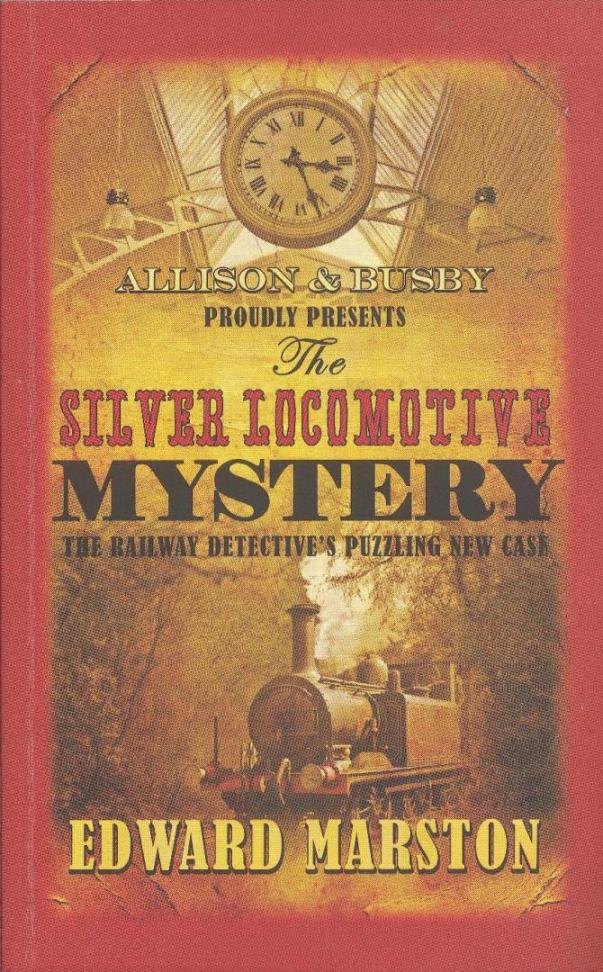
I read this book in February, 2014.
"The Silver Locomotive Mystery" is book six in the interesting Railway Detective series set in the 1850s, written by Edward Marston, and featuring D. Inspector Robert Colbeck and his trusty assistant D. Sgnt Victor Leeming. Edward Tallis, Robert and Victor's boss, is still there, as abrasive and abrupt as before, but somehow I thought he seemed to be softening in character as the book progressed. Perhaps there is hope for him yet ?
The silver locomotive of the title is a very elaborate replica made in exquisite detail by the fine silversmiths Vokes of London. It turns out that old Mr Voke has failing eye sight, and is a very poor employer. His underpaid and overworked assistant, Hugh Kellow does most of the fine work which Mr Voke passes off as his own.
The story opens with two thespians, actor's troup leader Nigel Buckmaster and his co-star Miss Kate Linnane, sitting in a first class railway carriage of the Paddington to Cardiff train. Just before the train leaves the station, they see two men run along the platform - old Mr Voke and his assistant Kellow - and the young Kellow enters the compartment clutching a large bag, and obviously ill at ease to be travelling first class. The actors grill the young man, and eventually get him to show them what is in his bag - an extremely valuable work of art, a silver locomotive. Kate Linnane is entranced by the beauty of the locomotive - she can't take her eyes off it. Later, Hugh Kellow is found in a Cardiff hotel bedroom with a dagger in his back, and his face all disfigured with acid. And of course the Silver Locomotive is missing. (As an aside, let me add that we readers of murder mysteries know what it can sometimes mean when a victims face is badly disfigured. )
The Railway detective and Leeming are called in. We meet quite a few new interesting characters including Sup. Jeremiah Stockdale who is in charge of the Cardiff police - an able policeman, who unusually makes Robert and Victor very welcome. We also meet Mr and Mrs Tomkins. The Silver locomotive is a gift from Mr Tomkins to his wife. She is a terrible woman, snobbish, and very concerned with her social standing in Cardiff. She is determined to get her silver locomotive back, and is not slow at stamping her feet in raging displays of temper and petulance.
Of course, all is not as it seems, but Robert and Victor work methodically through the case. Poor Victor gets another bash on that hard head of his - he seems to suffer that fate in all these books. There are lots of twists to the plot as you would expect, and all in all, it's a decent enough story, well told by Edward Marston.
Robert Colbeck's desperately slow courtship of Madeleine Andrews continues. It's years since he and Madeleine first met way back in book one, but they are still just dear friends - although everyone can see that they are in love. What is holding Robert back? There is a hint that there is something - but finally, at long weary last, some progress seems to be made by the end of the book.
It's all a bit slow, and old fashioned - deliberately so - and it all chimes in with the style of the times in the 1850s. I enjoyed reading this book, and I'll be back for more from Robert, Victor and Madeleine. Will there be wedding bells in book seven - or will progress revert to that old familiar slow pace once again ? We shall need to see.
Links to author index and home page
| Edward Marston Heading | Author Index | Go to Home Page |

I read this book in March, 2014.
"Railway to the Grave" is book seven in the Railway Detective series set in the 1850s, written by Edward Marston. The detectives are D. Inspector Robert Colbeck and his trusty assistant D. Sgnt Victor Leeming, and all the usual characters are here - Superintendent Tallis, Robert's boss, and of course Robert's fiance Madelaine Andrews and her dad Caleb.
The book opens with Tallis getting bad news about an old army chum of his - his colonel Aubrey Tarleton - who has apparently walked into the path of a steam locomotive in Yorkshire, and committed suicide. Pinned to the colonel's coat was a note to contact Tallis, and so Tallis, Colbeck, and Leeming set out for Yorkshire. The poor colonel had been distraught at the disappearance of his wife some three weeks ago, and had been the recipient of particularly nasty poison pen letters, and had to bear vile local gossip that he had killed his wife.
Tallis is convinced that the colonel would never have committed the mortal sin of suicide - it is the 1850's. The local vicar is not as christian as he should be, and refuses to bury the colonel in consecrated ground. Eventually Colbeck and Leeming convince Tallis to return to London and get down to investigating the disappearance / murder of the colonel's wife and who had been sending the hate mail.
Colbeck and Madelaine are very much in love, but somehow Colbeck cannot bring himself to tell Tallis that he and Madelaine are engaged - Tallis is a man of very fixed opinions. It's a nice, straight forward story, and I kept turning the pages to see who might have killed poor Mrs Tarleton, and who was a true friend, and who not. Did the colonel's stepson whose only interest seemed to be in a possible inheritance, have anything to do with all these events. ?
The Railway Detective solves the case, but Robert and Madelaine's engagement has all the makings of being a long one. Yes, Robert Colbeck is very busy, but is he too busy to get married, and is Madelaine too nice a girl to complain ?
It's a good read, and paints an intereting picture of life in the 1850's. I'll read on.
Links to author index and home page
| Edward Marston Heading | Author Index | Go to Home Page |

I read this book in June, 2014.
This is book eight in the Railway Detective series set by Ed. Marston, featuring D. Inspector Robert Colbeck and his assistant D. Sgnt Victor Leeming, and set in Scotland Yard of the 1850's.
This is quite a good story, and partly tries to explain Robert's very slow courtship of Madelaine Andrews - eight books in, they have just got engaged, but no wedding date has been set. Robert gives 100 % attention to each of his very difficult cases, and decisions as to Robert and Madelaine's future need to be left until the current case is solved. But then a new case comes along, and off we go again, with Madelaine still waiting. Madelaine's father Caleb is worried for his daughter.
This story is about a ruthless thief, con man, and murderer, Jeremy Oxley, with whom attractive small time thief Irene Adman has become besotted. They make a great, but ruthless team. The story opens with the murder of two policemen taking Oxley to the hangman. They are on a train, and at the last minute, as the train is about to leave then station, Irene jumps into their carriage. She chats to the two policemen on the journey, then takes them by suprise by drawing out a pistol, and killing them. She has murdered to rescue her lover Oxley.
It turns out Jeremy Oxley killed Robert's first love, Helen Millington. Years ago, as a lawyer before he became a policeman, Robert persuaded Helen to give evidence for the prosecution against Oxley. They got to know each other very well, and fell in love. Oxley killed Helen, and Robert vowed to bring Oxley to justice. So now it is a personal crusade.
The book could also be titled "The Long Arm of the Law". Robert and Victor have to travel to America to chase Oxley.
Whilst all this is going on, Caleb, Madelaine's father, finally retires from his job as a train driver at LNWR. Now, he is around the house all day long, and Madelaine, a gifted artist, cannot get on with her painting. It's time she was married, and left home. Perhaps in book 9 ?
Links to author index and home page
| Edward Marston Heading | Author Index | Go to Home Page |
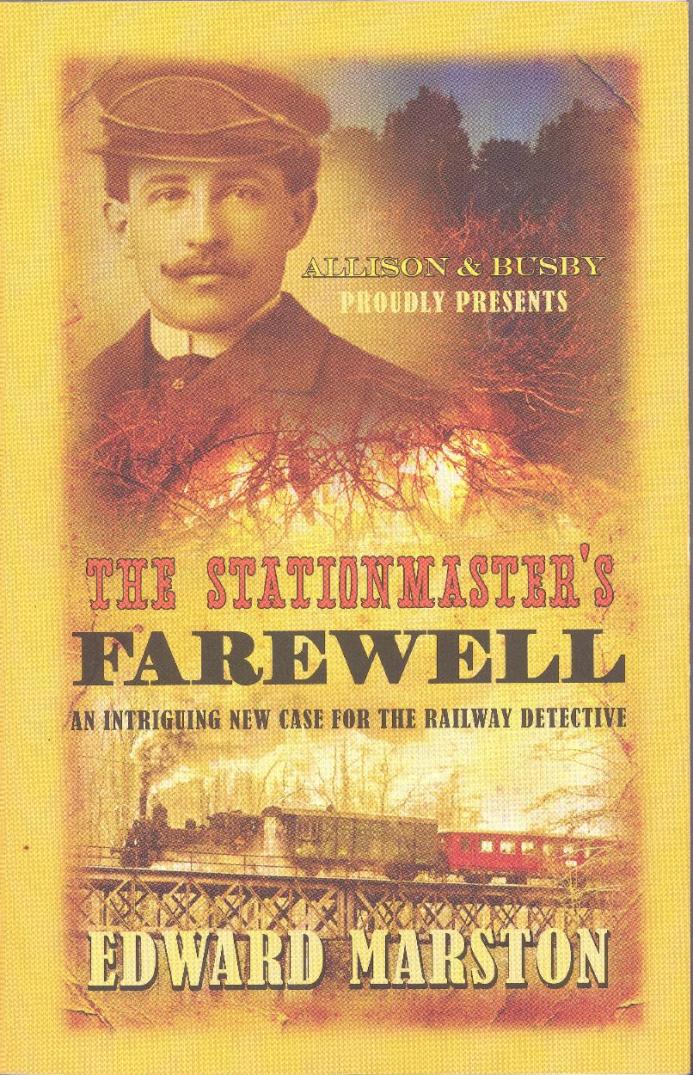
I read this book in September, 2014.
This is the ninth book in the Railway Detective series, featuring D. Inspector Robert Colbeck and his assistant D. Sgnt Victor Leeming. It is set in the 1850's. I thought it was a very good story that more than held my interest throughout.
Joel Heygate was the popular stationmaster at Exeter St. Davids station in Devon. But one day, he is late for work, which is very unusual. It seems he has disappeared. And then, the charred remains of a body are found in a bonfire. It must be the missing stationmaster - but who would want to kill such a popular person, and why dispose of the body in such a gruesome way?
Those of us who have read a lot of crime fiction prick up our ears when we learn that a body is badly disfigured and cannot be identified with certainty. Was it really Joel Heygate ?
Robert and Madeleine Andrews are very soon to be married - the last thing that Robert wants is a complicated murder that keeps him stuck in Devon. Can he solve it in time to get back to marry Madeleine ? Meanwhile, Madeleine's dad Caleb Andrews has been forming a friendship with Binnie Langton, but he is quizzed / interrogated by her sister Ivy Young, and he beats a hasty retreat. Soon he finds himself the target of both sisters - but Binnie doesn't know what Ivy is up to.
There are all sorts of new strong characters in this story - Superintendent Steel of the Exeter police, Mrs Rossiter and Doris Hope from the station tearoom, Bishop Philpotts, Dr Swift from the assylum - and of course Superintendent Tallis is on the scene, barking orders at everyone.
I thought it was a strong story - a real puzzle for Colbeck and Leeming. Of course the mystery is solved by the end, but if you want to know if Robert and Madeleine get married, you will need to read the book for yourselves.
Links to author index and home page
| Edward Marston Heading | Author Index | Go to Home Page |

I read this book in September, 2014.
This is book 10 in the Railway Detective series, set in the 1850's , and featuring DI Robert Colbeck and his assistant D. Sgnt Victor Leeming.
Robert and Madeleine finally got married at the end of book 9. Since then, they have lived in wedded bliss in London, but now, the services of the famous Railway Detective are required in Scotland, and Robert and Madeleine are separated.
The crime that has taken Robert and Victor to Scotland is the deliberate derailment and the death of three railwaymen on the Caledonian Railway. Superintendent Tallis has always been very resentful of the success and fame of Robert Colbeck, and initially he refuses the plea for help from Scotland. But when Robert sits down and starts to write his letter of resignation, Tallis soon changes his mind. It is a difficult case, with few clues - and the local police are resentful of Colbeck and Leeming being called in. Especially is this true of Superintendent McTurk, and old sparring acquaintance of Robert and Victors.
Little progress is made - is the famous Railway detective going to have to admit defeat? But then there is a breakthrough discovered by Madeleine and her dad Caleb who recognise the significance of a breakin to the house of the boss of a London train company. They rush up to Scotland to tell Robert. As per the title of the book, the true target of the criminals is the Royal Train, and a possible assassination attempt on Queen Victoria and Prince Albert.
It's a good story that builds to a fitting climax. I liked the structure of the book - it opens with an isolated shepherd in Scotland, and he is there again at the end. I look forward to reading the next episode.
Links to author index and home page
| Edward Marston Heading | Author Index | Go to Home Page |

I read this book in July, 2015.
This is book 11 in the Railway Detective series, set in the 1850's (1858), and featuring DI Robert Colbeck and his assistant D. Sgnt Victor Leeming. Robert is still happily married to Madeleine and living a contented life in London. Here we meet up with Robert and Madeleine once again, and also Sgnt Victor Leeming, who still grumbles when forced to travel by train (and boat), and Super. Tallis, Robert's boss. Tallis is still jealous of the now famous Railway Detective, and rules his empire with the strict discipline of an ex army man. Robert calls on help from Madeleine towards the end of this story - but is careful not to let Tallis find out. Caleb Andrews, Madeleine's dad, is still there, still with the same prejudices, and still convinced that as an ex railway man, he has the knowledge to help Inspector Colbeck solve all his cases.
This is a neat story. Its about young Immogen Burnhope, the only child of government minister Sir Marcus Burnhope. Sir Marcus and his wife have been overprotective of Immogen. To mix a few metaphors, she lives as a gilded bird imprisoned in a gilded cage, longs to escape especially now from an arranged marriage to MP Clive Tannadine, but in doing so jumps from the frying pan into the fire. The opening is intriguing. Immogen and her maid Rhoda board a non stop train to Oxford to visit her aunt Cassandra and cousin Emma. They are both waiting on the platform to greet Immogen, but no Immogen. She and he maid have both vanished - how is it possible ? Robert and Victor are called in to solve the puzzle.
Soon it is apparent that Immogen and Rhoda did get off the train, but in disguise, and are now kidnapped, but is Immogen part of the plot or just a silly girl who has fallen for the smoothe tongue of a "gentleman" who is not at all that he pretends to be. The tension builds nicely. Will Robert and Victor manage to rescue the ladies before the two kidnappers have their evil way?
Edward Marston conveys the 1850's very well. Its a class ridden society. Everyone knows their place, and the "superior" classes lead a life of privilege. Underclasses are defferential, know their place, and do not question those in authority. An interesting read, perhaps a bit of a curiousity, but I enjoyed it.
Links to author index and home page
| Edward Marston Heading | Author Index | Go to Home Page |
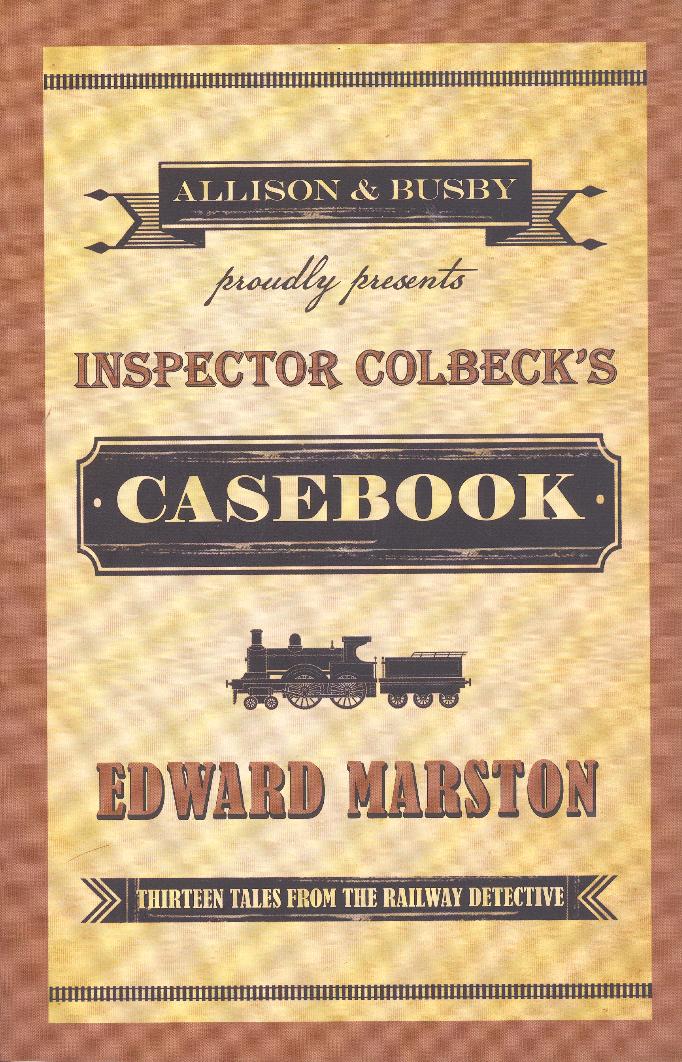
I read this book in May, 2016.
This is book 12 in the Railway Detective series, and it is somewhat different in that it is a collection of 13 short stories each about 20 to 22 pages long. It features all the characters of the books to date - ie DI Robert Colbeck and his assistant D. Sgnt Victor Leeming, Madeleine Colbeck, Robert's wife, Caleb Andrews, Madeleine's dad, and of course Super. Tallis, Robert's boss. I don't usually like short stories as I find them a poor substitute for a proper meatier full story, but I supose they do have a place in the market, and must be popular with some people. That said, I found that I liked these stories more than I thought I would. They were all about the main character and his associates, which is good. Some collections of short stories also include other work by the author, almost as padding.
What was good about these stories was that each had a beginning, a middle, and a sensible end, all within 20 odd pages. And all the characters got a turn in the spotlight. Thus Tallis was down after attending a funeral, and was consoled by a clergyman, to whom he gave a large £5 donation - remember it's set in the 1850s. The clergyman was a fraud, and Robert and Victor rode to the rescue. Caleb Andrews had a walet stolen by a pickpocket, Leeming was given the case, but Caleb was on hand to help apprehend the crooks. And in "Puffing Billy", Madeleine got to star. She wanted to sketch the old steam engine the "Puffing Billy," and was allowed free access when she mentioned that she was Madeleine Colbeck. Robert thought that his fame had done the trick, but no, the manager did not know who Robert was, but he had admired the work of that famous London steam engine artist Madeleine Colbeck. Madeleine was on hand to stop Robert making a mistake, and to get to the truth of the stollen sketches.
There is only so much you can fit into 20 pages, so inevitably solutions to puzzles came very quickly. Robert seemed to know what was happening almost instantly. I'd have liked a few false trails, and time for a few detours, but such is the short story medium.
All but one of the stories were set after Robert and Madeleine had got married. The exception was the last short story in the book - "The End of the Line". This was written in 2003 just at the start of the Railway Detective series. Edward Marston had written an anthology, and an extra short story was to be given away to everyone who bought a copy of the anthology. So, Marston thought he would give Robert Colbeck a trial outing. This was explained in a forward to this book - Marston said he had included "The End of the Line" to let people see how far the character had progressed, and developed, and I did find this very interesting.
All in all, I liked these short stories - they are OK to read once in a while.
Links to author index and home page
| Edward Marston Heading | Author Index | Go to Home Page |
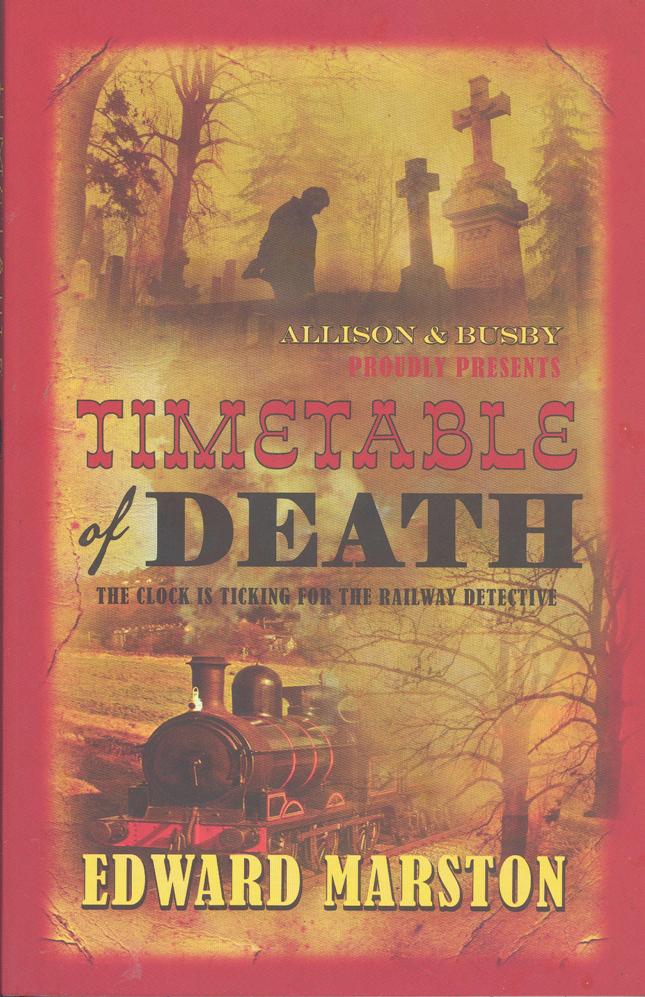
I read this book in September, 2016.
This is book 12 in the Railway Detective series, if we exclude the short stories book. Once again we have all the old crew together again for another adventure - ie DI Robert Colbeck, and his wife Madeleine, his assistant D. Sgnt Victor Leeming, a brief appearance of Madeleine's dad Caleb Andrews, and of course Super. Tallis, Robert's boss. The stories are set in the 1850s in the early days of what was eventually to become Scotland Yard. I didn't really see why the book got the title "Timetable of Death" - there was no particular connection to any timetable.
I did think that it was a very good story, though. We open with two children in the village of Sponden near Derby, playing hide and seek. The girl is a daring lass, and to hide from her brother she finds herself in the local graveyard, and dares to jump down into a freshly dug grave. There is a dead unburied body in the grave, and the girl's screams were heard throughout the village. The grave had been dug for Mrs Peet, a highly loved and respected native of the village, and mourned by her considerably older husband Mr Peet. The body was that of Vivian Quale, a director of the Midland Railway. His death baffles the local police, who are still trying to solve another murder of three years previously, and so a fellow director Donald Haygarth calls in the famous Railway detective to solve this murder hopefully more speedily. Quale and Haygarth were rivals for the future Chairmanship of the Midland Railway Board - i.e Haygarth is one of many suspects with motive. Quale was married to a sickly wife Harriet, and had two sons, the ambitious heir apparent Stanley, and the friendlier, easier going Lucas, and two daughters Agnes, and a mysterious, estranged Lydia who fled from home some years ago - or rather was driven away. Lucas Quale had had Lydia's boyfriend threatened and beaten up - and so a vengeful boyfriend is another of very many suspects.
Colbeck and Leeming get mislead badly, and receive little help from the local police. Everyone wants instant results, and Robert asks Madeleine to help (unofficially). Tallis even turns up to "help." Just who did the murder was a well concealed mystery, and held my interest throughout.
Early in the book, Robert is concerned at how tired Madeleine looks. We know what this probably means, and all becomes a lot clearer at the very end of the book.
A good story, and a good interesting read. It's an nice little quirky series.
Links to author index and home page
| Edward Marston Heading | Author Index | Go to Home Page |

I read this book in September, 2017.
This is book 13 in the Railway Detective series set in Dorset this time, in 1860. It is interesting to read of the early days of the police force, in the days before forensics. It seems strange that the detectives pick up a murder knife with their bare hands, and pass it round to examine it. 100 years later it would be a very different story, and today they would be looking for DNA etc.
The book opens with Rebecca Tullidge, escaping her husband the brutish railway employee Michael Tullidge - he manned a level crossing, and they lived in a tied house beside the railway track. She had put him to bed in a drunken stupour, and was running along the railway track to meet her lover John Bedloe, when she tripped over a corpse on the line. Sadly it was John, and Rebecca fled in terror. Bedloe had been employed by the railway as a railway policeman, and so a local big wig sends to Scotland Yard for the famous Railway Detective Robert Colbeck to be sent at once.
We now switch to London, where Robert and Superintendent Tallis are having a heated argument. Tallis has allocated the case to another detective, and Robert is furious - this is his expertise. Eventually when Robert is about to resign, Tallis lets drop why he wants Robert to stay in London. - "surely you have ties in London." This is a reference to Robert's wife Maddy who is pregnant and the baby is due very soon. Robert is amazed, touched, and obviously in the wrong. He didn't even think that Tallis knew that Maddy was pregnant. However Robert still wants the case, and he and Sergeant Leeming set off for Dorset - hoping for a swift investigation so that Robert can get back to Maddy before the baby comes. Maddy's dad Caleb does not approve - "Robert should be here with you".
When Robert Colbeck and Victor Leeming get to Dorset it seems there are lots of possible suspects - i.e. it's not going to be quick case. John Bedloe had been a cheating womaniser who preyed on lonely, unhappy married women. These were moral times and the women would not break their marriage vows lightly. John chose married women because he could have his evil ways without having to marry them. No woman was safe - not even the wives of relatives - and every cheated husband had a motive for vengeance. One poor woman was married to a sailor who was away at sea, fell for Bedloe's charms, got pregnant, was abandoned by Bedloe, and committed suicide. The husband returned to find his wife dead, and pregnant by another man. Surely he would want vengeance. And did Michael Tullidge know about his wife Rebecca and John Bedloe ? If so he could be another of the many suspects.
Robert and Victor work their way down the list of suspects. Could the murderer be a woman who found out she was not John Bedloe's only lover ? I thought it was a strong story, and I had no idea who had done the crime. Eventually, after lots of adventures - Leeming is shot at, the local big wig wants to use Colbeck's fame to get himself elected mayor, etc - the crime is solved, but Robert has to leave Sergeant Leeming to do the arrest. Maddy has been rushed into hospital with complications ! I won't spoil the story any further.
The above little summary doesn't really do justice to the book. It's interest is in it's historical setting, and an insight into the morals and harsh conditions of the time, deference, extreme povery, and hardship. Marston has made a speciality of historical settings, and he does it well. Of course I must read on to see what the future hold for Robert and Maddy. A final word - it's nice to see how Sergeant Leeming has developed into a good detective and a main character, not just Colbeck's assistant.
Links to author index and home page
| Edward Marston Heading | Author Index | Go to Home Page |

I read this book in July, 2018.
This is book 14 in the Railway detective series. This is set in 1860, and our familiar crew are back in business - Inspector Robert Colbeck, Sgn Victor Leeming, and their grumpy boss Superintendent Tallis. There are three other main charaacters in this episode - Helen Rose Colbeck is Robert and Madelaine Colbeck's baby daughter, and they both dote on her, of course. We also get a reappearance of the fighting, ex policeman Brendan Mulryne. Leeming says there is no one he would prefer to have with him when patrolling the dark, dangerous districts of London. And Madelaine's chum Lydia Quayle is back too - lending a helping hand.
There are three main subplots. The main story is that someone has derailed a circus train transporting Mauro Moscardi's Magnificent Circus. It's on a northern line, and the owner of the line, a Tapper Darlow, calls in Inspector Colbeck. The second story is the discovery of the body of a woman in a shallow grave - near where the circus train was derailed. She was poisoned and covered over lightly with earth - and discovered by Jacko, the monkey from the circus. Why was she killed, and by whom ? And are these two cases related ?
The third story is that someone is stalking Lydia Quayle - she moves from hotel to hotel to escape him, and ends up as Madelaine's house guest. It's a pity that Robert and Victor are away up north.
Tapper Darlow pesters Colbeck to concentrate on finding which rival railway company did the derailment. Mauro Moscardi insists that it is a rival circus that is the culprit, and wants Colbeck to devote all his efforts in that direction. So Colbck has to investigate two crimes at the same time - firstly who did the murder, and then the ongoing repeated attacks on the circus.
Brendan Mulryne works for the circus as general helper, and security chief - and Victor goes undercover to work at the circus under Brendan to find out who is doing these attacks.
It's a good, strong story . The arrival of a circus to a town in the 1860s was a real highlight and treat, and Marston describes the scene well. I enjoyed reading the story.
Links to author index and home page
| Edward Marston Heading | Author Index | Go to Home Page |
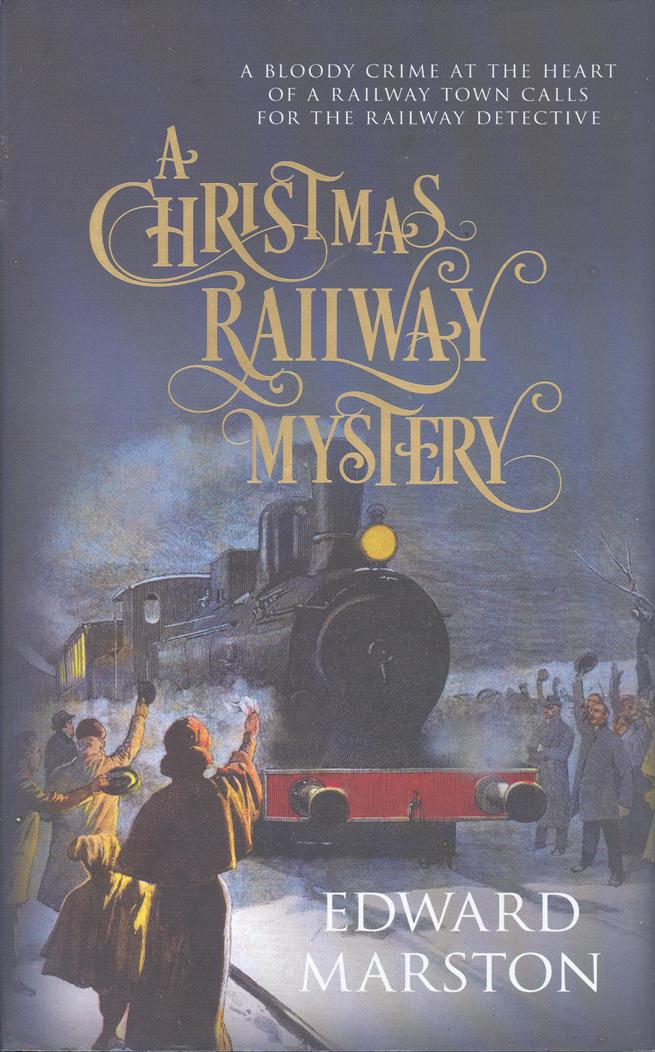
I read this book in July, 2018.
I am a bit puzzled at the appearance of two Railway Detective books in the same year, and this, the second one, doesn't seem to know of the existence of the first one. Colbeck and Leeming are in Swindon tacking another railway crime, but just as their investigations near completion they are distracted by the news that Superintendent Tallis has been abducted. Their thoughts are on his safety and a desire to get the Swindon crime solved so that they can be on their way to rescue Tallis. Colbeck cannot think of one without worrying about the other, and he says that he has never before had to think of two crimes simultaneously. That is exactly what he had to do in the previous book - The Circus Train Conspiracy ! How extraordinary to forget so quickly.
This is book 16 in this very readable historical series set in 1860, featuring Inspector Robert Colbeck and Sgnt Victor Leeming. The book opens with them in Superintendent Tallis's office to be told two things. Firstly Frank Rodrum, a GWR employee at their Swindon Locomotive works, has been found murdered and decapitated. Colbeck and Leeming have to look into it - and they will need to work quickly if they are to get back to London in time for family Christmases. Robert is determined to be there for his daughter Helen's first Christmas. Secondly Tallis says he is unusually taking some time off (a weekend) to attend a regimental reunion, and that Inspector Grosvenor will be promoted to temperory Superintendent in his absence. Colbeck is the obvious choice for any promotion and Leeming tells Tallis. Colbeck himself is not bothered as he prefers to be out in the field tacking a railway crime, rather than desk bound. Besides, he says its only for a few days. Little did he know ! Grosvenor has always resented Colbeck and hated being in the shadow of the famous Railway detective, and now he can be in charge. It's a case of giving a man enough rope, and he will hang himself.
Frank Rodrum had married Mary, the most atractive girl in the town, and one who had had lots of male admirers. They had three children, and lived in a GWR tied house. Now Mary and the kids would be homeless. Frank was mostly a good husband and father if sober, but he changed personality once he had a drink, and made lots of enemies. So Colbeck and Leeming have lots of suspects, and eventually whittle it down to five, but which of the five is the problem, and the case seems to be dragging on. Grosvenor appears on the scene belittling Colbeck, but almost instantly comes news that Tallis has been kidnapped, and Grosvenor is summonsed back to London. How terrible for Tallis that he has sent his best detective to Swindon, and it will be down to second rate Grosvenor to try to rescue him. I'll say no more - I never intend to write spoilers. However Tallis does come out of this book with his reputation more than intact. Tallis never praises Colbeck to his face - might that now change ?
At home, Madelaine has returned to painting in the little gaps whilst Helen is asleep. Lydia Quayle is still a frequent visitor, and young DC Hinton, who helped Lydia, is also still around. There are hopes for romance but this needs a little shove in the right direction, and it will soon be Christmas.
I read The Circus Train Conspiracy earlier this month and enjoyed it so much that I rushed to read this book just a couple of weeks later. If it's a good book, I read it all too quickly, and this was the case here. I'll now need to await publication of the next book - "Points of Danger" to get the next instalment.
Links to author index and home page
| Edward Marston Heading | Author Index | Go to Home Page |

I read this book in July, 2019.
This is book 17 in the Railway Detective historical fiction series - the year is 1861 in this story. Once again Inspector Colbeck of the Met. is called in to solve a railways related crime, this time one set in Norwich. As before Sergeant Victor Leeming is Colbeck's assistant, and again as before Superintendent Tallis is Robert's boss. In the previous book Tallis had been kidnapped and was about to be flayed alive by vengeful kidnappers when he was rescued at the very last minute by Colbeck, Leeming and a young PC Alan Hinton. That was three months ago. Ex soldier Tallis, the indestructable returned to work immediately, but it soon becomes apparent that Tallis is suffering from what we would now call delayed PTSD - post traumatic stress disorder. Tallis has wide mood swings, goes off into trances, and doesn't know his colleagues nor himself. Colbeck and Leeming are in Norwich when Tallis becomes incapacitated - it's young Hinton that gets him help. Hinton was a hero in saving Tallis's life, but far from promoting him, Tallis had been ignoring him, and giving him menial jobs. All the more credit then to Hinton for helping Tallis. Colbeck explains the position to the commissioner, Tallis is sent on sick leave / holiday, and Colbeck gets Tallis's ex army friend Wardlow to have Tallis come to stay with him and his wife. The poor state of Tallis's mental health is one of several parallel stories that run throughout this book, and all the stories converge into a great climax at the end.
The main story is the murder of MP and railway promoter Jarvis Swarbrick. He was alone in a first class compartment with his young wife Grace when someone switched the points and forced the train into a siding. A masked man on a horse galloped up, flung open Jarvis's carriage door, grabbed some valuables, and coldly shot Jarvis between the eyes, and in front of his terrified wife. This is the murder Colbeck has to solve. Grace is Jarvis's second wife, a young woman whom he married indecently soon after his first wife's death - at least this is what Jarvis's estranged son Andrew Swarbrick thinks. Andrew seems a most unpleasant young man - he wants Grace out of the family home and claims it is his right to be the new MP. Our sympathy is with the poor widow - but, as always, not all is as it seems.
There are two smaller sub plots. Lionel Fairbank has offered Robert's wife Madeleine a sizeable commission to paint a railway scene as viewed from his country estate - but is he who he claims to be, or has he designs on Madeleine, and Robert is not there to offer Madeleine his protection and advice. Luckily Madeleine's friend Lydia is around - and, talking of Lydia, the growing romance between Lydia and PC Alan Hinton continues to make painfully slow progress. All is not well between Madeleine and her interfering father Caleb, and she has to put him firmly in his place. Happily they are friends again by the end of the book.
I though the book was well structured. Lots of things were happening at the same time, and the author kept lots of balls in the air at the same time. Investigations meant Robert and Victor had to stay in a temperance cottage (much to Victor's displeasure) and Victor had to travel to Great Yarmouth and Jersey. Although Robert is always the master detective Victor is turning into quite a decent detective too. We were almost at the very end of the book when all the stories climaxed, with quite a surprise or two. The murder mystery had a good ending, but the Madeleine / Fairbank sub plot sort of fizzled out I thought. I am still not clear if Fairbank ever meant Madeleine any harm, although he was less that 100% honest with her.
It was a good book with good stories that kept my interest throughout, and we get a free history lesson about life in the 1860s.
Links to author index and home page
| Edward Marston Heading | Author Index | Go to Home Page |
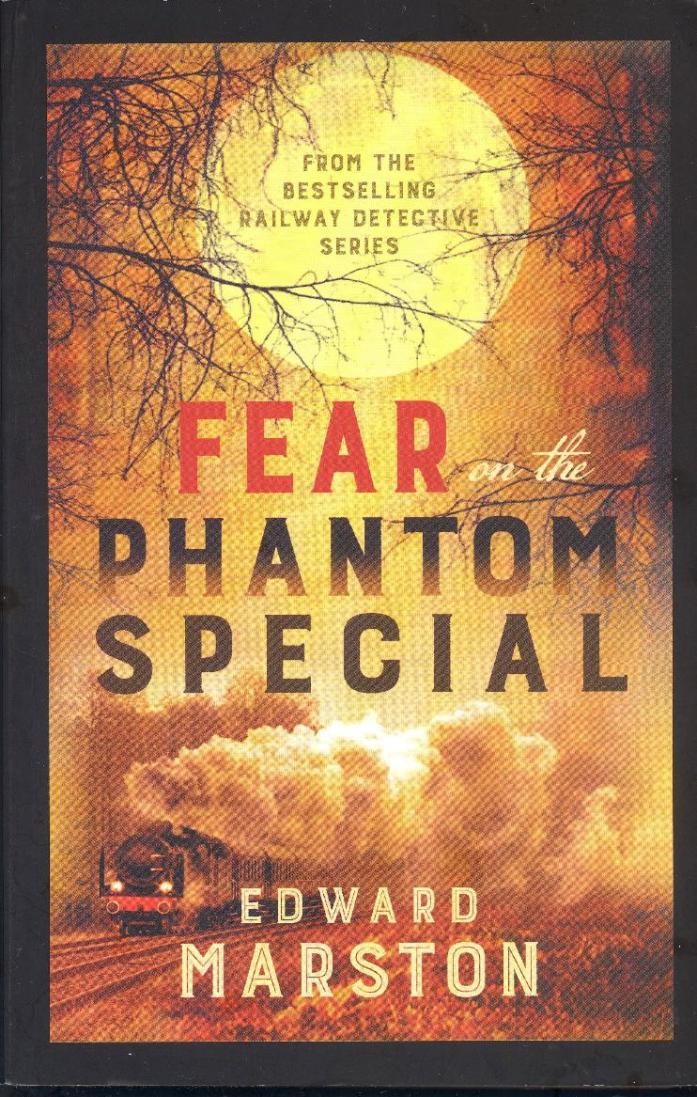
I read this book in December, 2021.
This is book 18 in the Railway Detective series. Inexplicably I bought book 19, "Slaughter in Sapperton Tunnel" and read it straight away, forgetting that book 18 was still sitting on my shelf, unread. Anyway, we meet once again DI Robert Colbeck, and his assistant DS Victor Leeming. Robert is married to Madeleine, and they have a daughter Helen. Maddy's best friend is Lydia Quayle, and Maddy's father is retired train driver, Caleb Andrews. Leeming is married to Estelle. Robert's boss is Superintendent Tallis, ex army, and usually a rude, unfriendly, strict displinarian, but he has just returned from sick leave, a changed man - friendly, polite, and full of praise where it is due. He even congratulates Colbeck for his successes in his absence. The character change lasts for half this book, and then the old rude Tallis reappears and it's business as usual.
This is a good story which opens on Hallowe'en, 1861. Alexander Piper, betrothed to Melissa Haslam, and nephew of Lord Culverhouse, Lieutenent of the County, has hired a train - the Phantom Special - to take Alex and some guests from Kendal to Windermere for a midnight picnic in reputably haunted Hither Woods. For a wager, the local blacksmith, Gregor Hayes had entered these woods one midnight some 10 years ago, and was never seen again - but his best friend local policemen Sgnt Ainsley never gave up the search. The Phantom Special shudders to a halt, and Alex jumps out to sort the problem. The train driver points to a fire some distance away blocking the line, and there is eerie mocking laughter. Furious and impetuous, Alex runs off towards to fire, jumps through a hoop of flames, and is never seen again. The train excursion is over.
Lord Culverhouse sends London a telegram, summonsing the famous Railway Detective to come and find his nephew. Colbeck and Leeming set off for the Lake District, Leeming protesting as always when rail travel is involved. They are met at Kendal station by Alex's best friend, the lawyer Hedley, who has booked them into the local Riverside Hotel - the beer is good there, so Leeming is happy again - and Hedley takes them to see Lord Culverhouse. Hedley had organised the train excursion for Alex, and is very helpful. He gives the detectives a list of all who were on the Phanton Special, all who were in Alex's compartment and even lists four names, Alex's enemies, who might be potential suspects. These four are Miss Caroline Treadgold , whom Alex cruelly dumped when he met Melissa, Dr Cecil Dymock , Alex's neighbour (acrimonious border dispute), Norman Tiller , local bookseller and poet whose poems Alex savagely publicly mocked, and Walter Vine , a former best chum with whom he fell out over Caroline Treadgold, and whom he injured in an illegal duel. As they investigate, Colbeck and Leeming interview each of these suspects, and the author keeps each in play throughout the book as he drips feeds us with more and more incriminating evidence against each. Misdirection at it's best.
Colbeck and Leeming visit the site of the railway fire, and of course Hither Woods at midnight. Colbeck becomes convinced that Alex Piper's disappearance is linked to the old Gregor Hayes case. Each had bad reputations - Gregor was a ladies man who often took a fancy to married ladies, and Alex was really nasty and quarrelsome, and often in trouble with the local police, but protected by his uncle. Lord Culverhouse berates Colbeck - "I didn't summons you to waste your time with an old disappearance", and he threatens to complain to friends in high places. Alex is the estranged son of the Reverend Rodney and Mrs Piper - when they objected to his life style he left home. Melissa thinks he is of honourable, upright character, the son of an archdeacon. She has led a sheltered life, and knows nothing of Caroline Treadgold. Hedley wants to protect Melissa from Alex and Hedley also wants to befriend Caroline, who is still in love with Alex. It is Caroline who joins the search for Alex, not Melissa.
And so the story unfolds. Who is the mysterious dark runner, is he the phantom ? The detectives' horse and cart is stolen when they visit the woods, and Leeming is later ambushed but manages to fight off the cosh wielding assailant. Which of the four suspects is it, or is the lawyer Hedley also a suspect, and even Lord Culverhouse. It all builds to a climax, and the final solution makes sense.
There are several sub plots. One is the ongoing but glacially slow romance between detective constable Alan Hinton and Lydia, but we also have another mystery - what has happened to Caleb Andrew's pride and joy, his long service railway medal ? He is getting forgetful in his old age, has he misplaced it, or has somone stolen it ? He wants Robert to return straight away to find the thief. Instead Maddy and Lydia investigate, with unofficial help from Hinton.
All in all, a good story, well set in an interesting 1860 background.
Links to author index and home page
| Edward Marston Heading | Author Index | Go to Home Page |
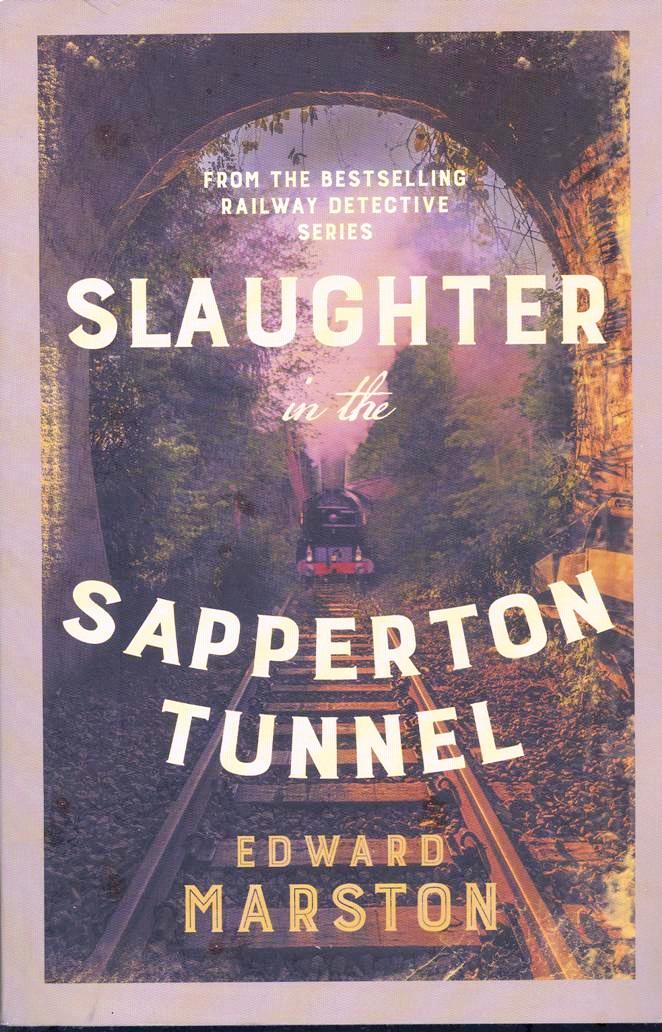
I read this book in November, 2021.
It is over a year since I read the previous book in this series, and it was interesting to return to 1862 and find it's business as usual in this book 19 of the series. Superintendent Tallis, still in charge at the Met, is still as grumpy as ever. Inspector Robert Colbeck is called for by name to solve serious Railway crimes, and off he goes with Sergeant Leeming, who still doesn't like travelling by rail. Robert lives with his artist wife Madeleine, and they have a young daughter Helena Rose. Old Caleb Andrews still calls round to play with his grandaughter Helena Rose, and Lydia Quayle is still Madeleine's friend. Another still, I am afraid - Lydia's romance with a young detective at the Met, Alan Hinton, also still proceeds, but at a snails pace. In this story Colbeck and Leeming ask for reinforcements, request Alan Hinton, and happily Tallis agrees.
The big mystery to solve here is who has caused a bad goods train derailment at Sapperton Tunnel in the Cotswolds, in Gloucertershire ? As the train came out of the tunnel it found the line blocked by a sheep pen with 7 sheep in it, and then a huge pile of boulders behind. It derailed, the driver Oliver Poulter and firemen Len Treese are seriously injured, and of course, the 7 sheep are killed, and the tunnel on the GWR line is blocked. It is Stephen Rydall, a local farmer and businessman who is on the board of GWR who calls in Colbeck. He lives locally in a big house called the Grange, and he has the driver and fireman cared for there. Rydall sees the derailmant as a personal attack on himself and GWR - Rydall's shepherd Edgar Smayle is missing, and his sheepdog Blackie. The Smayle family are in despair - Edgar's wife Betsy, and his two children Annie, and Will, a slow witted boy but, like his father, a good shepherd. Annie knows the family may be evicted and tries to carry on as usual looking after the sheep, but Will is obsessed with finding his father, and searches on hopelessly night after night.
Rydall suggests several suspects to Colbeck and Leeming. The first is a local squire Etheridge (70) who is very anti the railway and extorted a huge sum to grant them rights to cross his land. The second is a local businessman Beckingham who built up a vast canals based enterprise that suffered when the railway competed for business. A third possible suspect is Rydall's estranged son Michael Rydall. After a big scene, he emigrated to Canada but is reportedly back in the UK. He now has a daughter, and is secretely still in contact with his mother Catherine who hates deceiving her husband. Stephen Rydall will not allow anyone to ever mention Michael's name. Could Michael want revenge ?
Colbeck, Leeming and Hinton split up, and interview Beckingham and Etheridge, and look for Michael. The local pub nearest the Sapperton Tunnel is the canal side Daneway Inn, run by Peter and Molly Doble. Leeming accepts their offer of free beer ( until caught by Colbeck ) and mixes freely with the barge people who drink there. The barges are driven through the canal tunnel by legging - lie on the roof of the barge, and "walk" along the roof of the tunnel pushing the barge. It's hard, thirsty work, and so the Daneway is a popular Inn. Beckingham visits there - he has a bad reputation and Molly is careful never to be left alone with him. The shepherd Edgard Smayle also visited the Daneway, but got nasty when drunk, picked quarrels and was asked to leave. People feared his dog Blackie. He always apologised when sobre, and was allowed to return - business is business.
Squire Etheridge had an acomplice in Rev Clinterly, principal of the nearby Agricultural College, sadly a corrupt man of the cloth. They try to put Colbeck in his place, but find he is made of sterner stuff. Another suspect emerges in tales of a surly mysterious stranger going round local churches and scenes of crime, and doing sketches. He is later identified as a Frances Gregory. The story now takes off. Someone takes a pot shot at Colbeck - so the detectives carry pistols. Sheepdog Blackie's head is fished from the local canal. Eventually someone hands Rydall a ranson note for Edgar Smayle - £5,000. Strangely it is Michael Rydall who contacts Colbeck and gives him a new perspective on the crime. And now we have the build to a terrific climax, unearthing of the ransomers and eventually find out what the crime was really about.
It's not must read fiction, but it is well researched and well written historical fiction, and an interesting read.
Links to author index and home page
| Edward Marston Heading | Author Index | Go to Home Page |
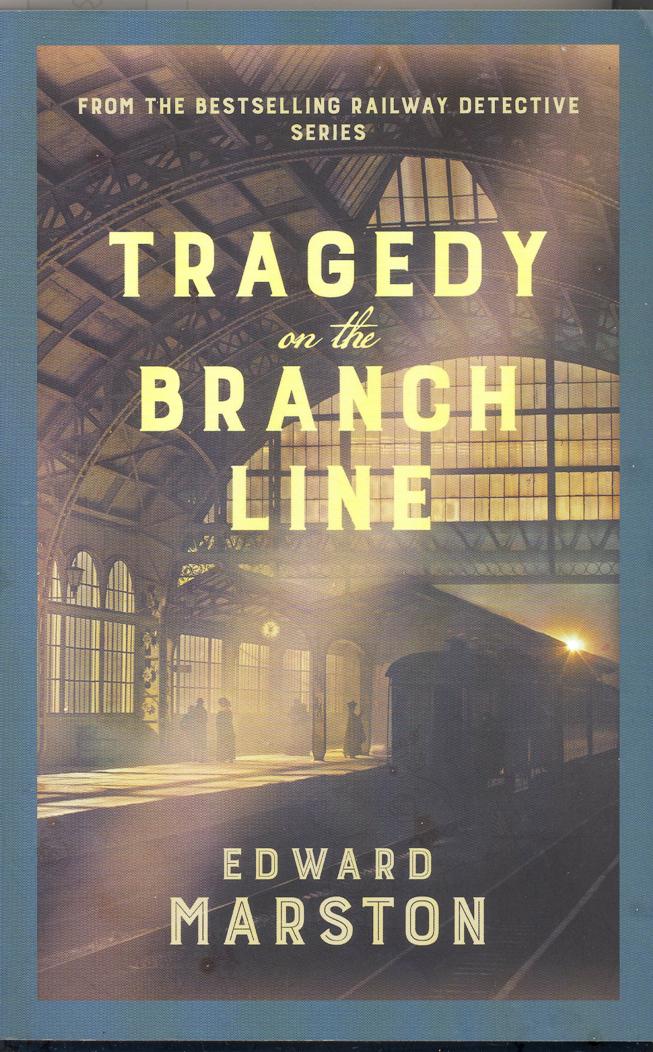
I read this book in July, 2022.
This is book 20 in the Railway Detective series, featuring Inpector Robert Colbeck, and Sgnt. Victor Leeming. Robert is married to Madeleine, a gifted artist specialising in railway scenes. They have a little daughter Helena Rose who has a doting grandfather Caleb, Madeleine's dad, and ex LNWR. Lydia Quayle is Madeleine's best friend, and she is in a sort of glacially slow romance with constable Alan Hinton. Victor is married to Estelle. Colbeck and Leeming both work for Superintendent Tallis, ex army. It's historical crime fiction, and this story is set in 1863, just before the annual Oxford v Cambridge Boat Race.
The book opens with Bernard Pomeroy, a brilliant all rounder, Cambridge student of Corpus Christi waking to find a note has been pushed under his door. He recognises the handwriting, reads it, flies into a panic, and rushes off to the station but leaves a note with Jack Stott, the college porter, addressed to Nicholas Thorpe, his best friend, and fellow member of the Cambridge Boat Race crew. It's an apology for having to miss that morning's training. Pomeroy was the gifted cox, the Cambridge crew's not so secret weapon. Pomeroy rushes off to the station, and catches the next train to Bury St Edmunds. In his rush he does not see a man in the ticket office hiding beneath an umbrella, nor realise he is behind him in the queue, nor feel a pin prick as he boards the train. The mystery man sits in the the same compartment. Pomeroy, normally 100% super fit, feels unwell, but makes it to Bury St Edmunds. He staggers along the platform, and then collapses. Our mystery man, possibly a foreigner, bends to take Pomeroy's pulse, but there is another pin prick in the neck. The mystery man shouts he is dead, get the police, and melts away. The only good thing about the death is that it happens on a railway platform, and after the college master Sir Harold Nellington writes to Super Tallis, will be investigated properly (and solved) by the famous Railway detective, Robert Colbeck.
This then is the story - who was the mystery man, why did he kill Pomeroy, and was he acting alone ? Colbeck and Leeming base themselves in Cambridge, and travel on the branch line to Bury St Edmunds as required. They visit Pomeroy's room in college, and the scene of crime in Bury St Edmunds, and start extensive interviews searching for possible suspects. The Cambridge Boat crew - president Henfrey-Ling, and coach Webb - say it's sabotage by the rival Oxford crew, but surely they would not resort to murder? Pomeroy was almost universally popular, and outstanding at everything he did, but did make some enemies. He was an "Apostle" invited campaigning member of a Christian society founded by the Bishop of Gibraltar. Springett, professor of divinity, had failed to get membership, and was jealous of Pomeroy who took pleasure in baiting the professor. They both read Marlowe, but argued over this too - Pomeroy out debated the professor and made him a laughing stock. Pomeroy was also a gifted amateur actor, who twice beat a fellow student Simon Reddish to the leading roles. Simon's dad was a famous professional actor, and Simon wanted to be the same, but felt thwarted by Pomeroy. Andrew Kinglake coveted the cox role in the coming boat race, but had been dumped in favour of Pomeroy. All bore a grudge, but was this a motive for murder ?
Pomeroy's middle name was Zanni, and so there is a strong Italian (Tuscany) connection to this story. Pomeroy's father was British Consul in Florence, and a friend of the future PM Lord Palmerston. Bernard Pomeroy's dad died some years ago, but he had two sisters, one in Ireland, and one living with his mother in Italy. Possible suspect Simon Reddish had Italian connections too, and claimed to be an old friend when they both lived in Italy. A railway policeman by the name of Bullen gives impressive help in Bury St Edmunds. He had seen Pomeroy on previous visits when Pomeroy had been met a young lady of remarkable beauty. Bullen said any cabbie would remember her, and where he took the pair - and so it proved. The waitress at The Fox remembered the pair also - they were talking Italian, the girl was called Isabella, and she called him Bernardo. So the hunt is on for Isabella, and the mystery man.
Alan Hinton has been added to the team to cover the Oxford side of things - i.e. did the Oxford crew nobble Pomeroy ? The Oxford team president is Pinckney, and the coach, Brannigan, a rough Irishman capable of anything. Both these characters lie to Hinton - maybe the sabotage theory is not so far fetched. I liked the bit where matchmaking Madeleine arranged for Lydia to accompany Hinton and stroll together along the boat crew river - perfect cover for the policeman. Leeming was doing the same job in Cambridge. Colbeck, whose grandfather had been a cabinet maker, had found a secret compartment in Pomeroy's desk, and the key that opened a locked box containing two letters, one from best friend (possibly more that just a best friend) Nicholas Thorpe, and one in Italian from Lord Palmerson, whom Colbeck later interviews. Thorpe later breaks into Pomeroy's room to retrieve the letter. There are all sorts of plots and subplots, and often I thought this can't be relevant. Eventually Colbeck and Leeming turn their attention to the local Italians and more progress is made. Bullen saw the mystery man, and the girl, and so is there to help - more than help, he rescues Leeming from his knife waving attacker.
I didn't think it was a really good story, and some of the clues were a bit fanciful, but it was OK. I'll leave you to decide for yourselves. Let's conclude with a bit about the private lives subplot. This starts with Caleb excusing himself from a dinner date with Madeleine with an excuse she knows to be a lie. We also join a mystery woman in a grave yard blowing a kiss to a gravestone. Madeleine tackles Caleb about the lie, and they fall out seriously. In brief Caleb has a sort of lady friend in Elsie Gurr, but when she visits his house, she says she can't stand his pride of place railway engine painting, and asks him to turn it to face the wall for her next visit. Caleb grits his teeth, but says nothing. A couple of times, Madeleine had seen a woman staring at her house, and, friends again with her dad, she tells him about this. It's Elsie, who wants to live with Caleb in the basement of his daughter's grand house. Exit Elsie.
It's a good series, and I like the 1860s setting which seems to be done well, but usually the plots are more realistic than this one.
Links to author index and home page
| Edward Marston Heading | Author Index | Go to Home Page |
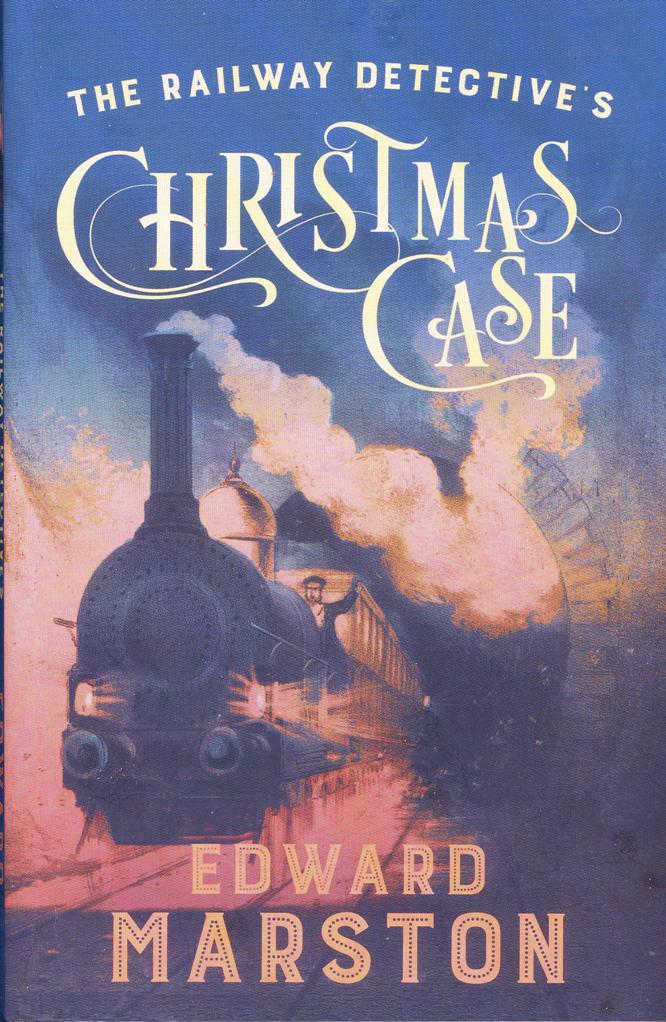
I read this book appropriately at Christams in December, 2024.
This is book 21 in the Railway Detective series and is set in December, 1864. Strangely I didn't know it existed until I spotted it in "The Works" bookshop and realised I hadn't read it. Books there are currently 3 for £6 (if you can find three) or £2.50 each. I now write these mini reviews under the following headings : Characters, Personal Lives and Main Plots.
Characters :
Inspector Robert Colbeck is a wealthy former barrister now working at Scotland Yard. He is married to Madeleine, and they have a 4 year old daughter Helena.
Caleb Andrews is Madeleine's dad, a retired train driver.
Superintendent Edward Tallis is Robert's boss at Scotland Yard.
Sergeant Victor Leeming is Robert's assistant.
DC Alan Hinton is a Scotland Yard detective who often reinforces Robert and Victor on a tricky case.
Lydia Quayle is Madeleine's best friend - she and Alan are attracted to each other.
Inspector Vellacott is a local policeman at Gt Malven.
Constable Raymond Berry is another local policeman at Gt Malven.
Jerome Appleby (60s) is a wealthy Midland's industrial businessman and benevolent employer.
Lady Emily Foley, is an owner or extensive estates, and is the haughty, bossy Lady of the Manor of Gt Malven.
Cyril Hubbleday is works manager working for Appleby. He is married to Dorcas, and they have two children good looking Marion, and younger Ellen. Cyril is the first victim (ch 1)
Reuben Hubbleday, is Cyril's brother
John Armitage, manager at his family's brewery business, and Philip Wren, of Wren's Timber Yards, are the former and current Marion Hubbleday suitors.
Ernest Drake is a company accountant at Appleby's coach company, and a good friend of Hubbleday.
Derek Churt works is a painter in the carriage paint section of Appleby's coach works at Oldbury. Derek is married to Agnes, and they have a young son Peter.
Simon Wragg, married to Nancy, is a painter in Derek Churt's section. He has a brother Terry.
Oliver Innes is Hubbleday's deputy works manager who takes over on Hubbleday's death.
Col Francis Yardley lives in Gt. Malden and is a friend of Lady Foley. His wife Charlotte is an invalid in a wheel chair. She came to "take the water" in Gt. Malven and they stayed. Col Yardley is ex army, and a crack shot. Like Edward Tallis he served in India.
Samuel Waycroft, married to Miriam, is a possible suspect.
Dr Montgomery Peck is a Midlands pathologist.
Mr Harold Unwin is the station master at Gt. Malven.
Mrs Renshaw is an hotel owner in Gt Malven and possible clairvoyant.
Main Plots : It's December, 1864. The railay coach company's Christmas outing to Appleby Court in Gt. Malven is a workers treat. When the train stops at a line blockage, the works manager Cyril Hubbleday gets out to complain, and is felled by a sniper's bullet. Lady Foley of the Manor of Gt. Malven summons Scotland Yard to investigate, Colbeck and Leeming attend, and Superintendent Tallis joins them. Colbeck and Leeming get off their Midlands train at Malven Link to view the scene of the crime, Tallis continues to Gt. Malven to report to Lady Foley. Colbeck soon finds where, high up, the killer lay in wait. Constable Berry had been on site - he is helpful and explains that these excursions are non too popular with the locals. Hordes of people descend on the place, leave their mess behind, and crowd the locals out of their pubs. So, is the killing a warning protest against excursions, or a personal hit against Hubbleday ?
Inspector Vellacott of the local police had been asked to investigate by Appleby, and he clashes with Tallis who effortlessly dismisses him. "Scotland Yard has extensive experience of murder investigations, you, Inspector Vellacott have none. But we need your local knowledge and help." Colbeck and Tallis visit Appleby - he is delighted to see them. By chance Vellacott is there too, and says he has two suspects. Appleby asks the company accountant Ernest Drake, a great friend of Cyril Hubbleday's, to break the terrible news to the family, but when Drake arrives he finds a local policeman there. Someone had pushed a note through the letter box boasting Hubbleday is dead. What a cruel thing to do !
Colbeck speaks to Dr Peck, the local pathologist. The victim was killed by a bullet in the head from a Pattern Enfield rifle, a military weapon - the killer might be ex army. Inspector Vellacott's first suspect James Carmody, is clever and has railway experience, but has disappeared. Another suspect is too stupid to even be an accomplice. However, another Vellacott suspect is Samuel Waycroft. Dismissed for drink, he tried to punch Hubbleday who promptly felled him with a punch to the chin. Waycroft is ex army, used to work for the railways, and is now working as a barman in a country pub. Colbeck decides they need more help, and gets Tallis to send for DC Alan Hinton. Chatting to Lady Foley, Tallis tells her he is ex army, and had served in India. Lady Foley says he must meet her occasional dining companion, local Col Francis Yardley who has a similar background. Tallis and Yardley do meet, and get on well together.
Colbeck looks for Waycroft and meets his sister who admits her brother used to have a rifle, but she made him get rid of it. Hinton arrives - Tallis is staying in Gt Malven's best hotel, Colbeck and Leeming, also in Gt Malven, are staying at Mrs Renshaw's more humble but very comfortable hotel. She is an excellent cook, but Hinton's lodgings in Oldbury do not provide evening meals. Hinton goes to the coach works and interviews someone who had been on the excursion, the coach painter Derek Churt. Later, leaving an Oldbury pub after his evening meal, Hinton is jostled by two assailants - "we can smell a policeman a mile off." Hinton thinks they must be friends of the painter Churt - that is the only place he had been, how else could they know he was a policeman ? Hinton is not put off by jossling. Jumping ahead Hinton is again attacked, and has a broken arm. It would have been worse had the assailants not been disturbed and ran off. Hinton is sent back to London to recover.
Meanwhile, a second murder had taken place - a headless body is discovered on Worcestershire Beacon by Biddy Leacock. By lucky chance the body is soon identified - one of Vellacott's constables recognised the bulky build, and the tatoo on the arm. It's James Carmody for whom they are searching. It seems he would be an accomplice employed for his railway connections and possibly he blocked the line with sleepers and red flags. For whom was he working ?
Vellacott's men dig on the Beacon, and find Carmody's head. His tongue had been cut off - Dr Peck, the pathologist, thought probably as a souvenir by a collector. Biddy Leacock had decided to help the police and manages to find the murder weapon. Tallis had visited Col Yardley earlier and noticed his tiger skin trophy. Yardley is a collector and a known crack shot. Yardley makes no secret of his hatred for excursionists. Could he be a suspect ? Colbeck visits Churt, befriends his son, young Peter, and manages to enlist Churt's help. Later he will suggest a fellow painter Simon Wragg as a possible suspect for Hinton's attack. Leeming eventually catches up with the suspect Waycroft but he lands a surprise punch on Leeming, and gets away. Colbeck is considering some other possible suspects. One obvious suspect is the former suitor of Hubbleday's beautiful daughter Marion. John Armitage had been sent packing by Hubbleday, but with the father now dead, John and Marion might get together again. Someone else is puzzling Colbeck - the accountant Ernest Drake. He seems an unlikely best friend for Cyril Hubbleday but he visited most nights to play chess, and Cyril preferred his company to that of his family. There is indeed a lot more to this story.
But now, as usual, I have written more than I intended, and will leave you to read the book to see what happens, and who did it. I have already said that Colbeck and Leeming do get back for their family Christmases. However, before that, there is a thrilling and dangerous climax in a dark church - the Priory in Gt. Malven. All in all another interesting outing for the Railway Detective and well worth a read - at Christmas, or otherwise.
Links to author index and home page
| Edward Marston Heading | Author Index | Go to Home Page |
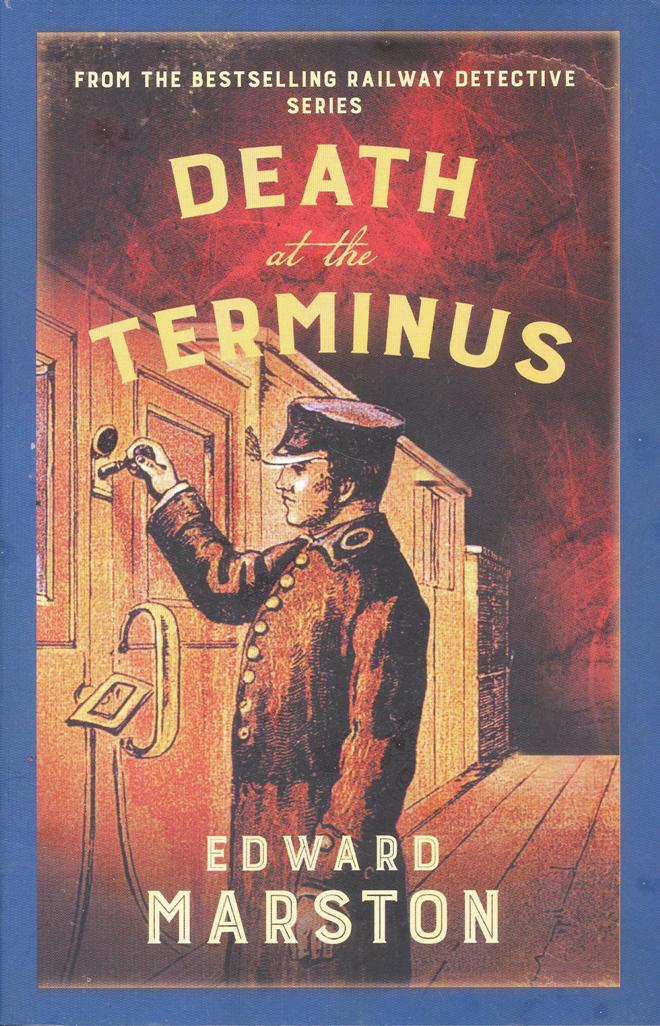
I read this book in April, 2024.
This is book 22 in Edward Marston's Railway Detective series set in England in the 1860s. Usually it's quite a good series, but I didn't care all that much for this outing. I thought it was a bit repetitive, and padded, and I hated the silly ending. Also I thought one of the regular characters, Madeleine Colbeck's dad Caleb Andrews, has now become very tiresome - everything he says is completely predictable. That said, it wasn't that bad a book, but not one of the best. Of late I have been writing these comments under three headings - Characters, Private lives stories and Main plots :
Characters. It's 1865. The main characters are Inspector Robert Colbeck, and his assistant Sergeant Victor Leeming. Colbeck's boss at Scotland Yard is Superintendent Edward Tallis, ex military. Robert is married to Madeleine (30s), and they have a daughter Helena Rose. Caleb Andrews, an ex LNER railway worker, is Madeleine's dad. Leeming is married to Estelle, and they have two sons, David, just started working for LNWR, and Albert who wants to leave school and become a policeman. DC Alan Hinton now usually helps Colbeck and Leeming. Madeleine is matchmaking between her best friend Lydia Quale and Alan Hinton - but no success, so far.
New characters are Jack Follis, a York railway guard, who is killed in a railway explosion. He lodged with Olive and Simon Cusworth. Gregory Maynard is the chairman of NE Railway, Neville Trimms is mayor of York, Fred Staines, is the York station master, and William Thomson, is Archbishop of York. Sarah Scawin owns and runs the successful Scawin Hotel, situated near the railway station. Superintendent Horace Nash heads York police, and PC Roger Pendle is a constable sent to spy on Colbeck and Leeming.
Nicholas Ewart is an archeologist and Viking expert heading a dig in York, whose wife died recently. Miriam Brightwell is a wealthy widow, a generous donor to charities, and she is sponsoring Ewart's dig. Bedfern is a poverty stricken area of York inhabited by the Irish. They came over during the potato famine some 20 years ago. Patrick McBride, a massive figure and serial criminal, is the Irish leader, and Tom Quinn a lawyer friendly to the Irish. Finally Owen Gale, a market fishmonger, is married to Margery, and they have a beautiful daughter Binny who is missing. Alice Kendrick is their neighbour, a fellow market stallholder (haberdashery), who detests and is terrified of Owen Gale. She is convinced he killed her beloved cat, Patch.
Private Lives : There is not much new here, just a continuation of the status quo. Madeleine calls on her friend Estelle Leeming with news that Victor has had to go to York with Colbeck. Estelle is concerned that he may now miss his son Albert's birthday. Madeleine's matchmaking between Lydia Quale and DC Alan Hinton shows little progress. They like each other, and Lydia admits to being lonely, but in 1860s England, she is a grand, well off lady, and he a humble police constable. Madeleine points out her own humble origins, but that she is now living very happily in a big house with servants with her beloved husband Robert. On the subject of class division, Madeleine's dad Caleb Andrews confesses that he feels out of place in Madeleine's grand house. Similarly Estelle Leeming feels comfortable chatting to Caleb, but cannot relate to Robert. Estelle's two sons are causing her some concern. David has just started working on the railway (LNWR) but doesn't like it. He doesn't like the early hours, all the swearing, and he is lot smarter than his fellow workers. Estelle asks Caleb to have a word with him. Albert, birthday pending, wants to leave school and join the police force like his dad, but Estelle wants him to continue his studies and better himself.
Main Plots. The book opens with an explosion in the guard's van of a train sitting in York station. The guard Jack Follis had just boarded, was caught in the blast, and staggered back onto the platform consumed in flames to die a terrible death. The mayor of York, Neville Trimms calls in the famous Railway Detective, Inspector Robert Colbeck who soon arrives in York with his assistant Victor Leeming. Straight away there is a question that needs to be answered - was it a deliberate attack on Jack Follis, or did someone have a grudge against the railway, with Follis an unfortunate victim? There is a lot to support both theories. Jack was a terrible serial womaniser. Many a wronged father or husband would love to see him dead. Jack had been such an absolute pest chasing the female servants at Sarah Scawins Hotel, that he had been barred. But he kept visiting, firstly in disguise, and then by bribing the night porter. Jack lodged with Olive and Simon Cusworth. Later Olive tells Colbeck that they regarded him as a son, but Olive too had fallen for his charms and not in a maternal way. After Jack's death, Simon wants to re-let his room, but Olive wants it kept as a shrine. Colbeck had received an unsigned letter saying the bomber was someone called Owen Gale. Robert and Victor soon find both Gale, and the anonymous letter writer. Aware they are being followed Victor and Robert split, Victor doubles back and catches their follower - a woman, Alice Kendick. There is fine little tale here. Both Alice and Owen are neighbours and have stalls on York market, but there is no love lost between them. Alice's cat Patch has gone missing, and she is convinced that Owen Gale killed Patch. Interviewed by Robert and Victor, it is apparent that she has no evidence, just a hatred of Owen Gale, but then she finally says something of note. Binny Gale, their beautiful young daughter, had started working at the railway, and had become infatuated by Jack Follis. Owen caught Jack chatting to Binny, and dragged her away, telling Jack to leave her alone or else. Binny rebelled, and went missing some six months ago. An extensive search failed to find her, and her parents (and Alice Kendrick) think she is dead. Here is motive indeed for someone wanting to kill Follis. On the other hand it could be someone with a grudge against the railways. There had been a series of minor attacks on railway property - all petty, but gradually increasing in severity.
More than usual, the local police force resented the two Scotland yard detectives interloping on their patch. Super Horace Nash wants Colbeck to work under his command, but Colbeck declines, saying Scotland Yard always has priority. Nash refuses to co-operate. He tells Colbeck to do his investigation and he will do one too, and we will soon see who wins. Colbeck calls in reinforcements - Tallis armed with a letter from the home secretary arrives in York and is magnificient in banging heads together. DC Alan Hinton is also called in to watch their backs. Robert and Victor are staying at Scawin's Hotel - Alan has to come in plain clothes and book into the same hotel but not acknowledge Colbeck nor Leeming. There is also another sub plot concerning the archeologist Ewart, doing a dig in York, and Mrs Brightwell sponsoring the work. Ewart lives for his digs, and resents the railways incursion into York, building a railway station within the city walls potentially destroying so much as yet undiscovered. Mrs Brightwell has loads of expensive jewellery that she cannot wear following her husband's death. She polishes it, wears it in secret, and wants to get married again - so that she can wear her jewellery (what a strange reason to get married !). I wondered why we are reading so much about Ewart and Brightwell - is there a romance in the offing? Or is there another reason ?
Who killed the guard ? Some blamed the Irish, some blamed anarchists. Before Tallis knocked heads together, and intent on beating Colbeck, Nash arrested an Irish man - Patrick MacBride - with no evidence what so ever. Tom Quinn, the lawyer, took up his cause, and organised a march on the police station - Alan Hinton, out gathering clues, took part in this march. Robert Colbeck had MacBride released.
There is another murder, this time it's Miriam Brightwell. Solving this is Nash's problem, but after Tallis's visit Nash and Colbeck are working tolerably well together, and Nash asks for Colbeck's input. This diverts Robert from the Jack Follis murder, much to Leeming's dismay, as he wants to get back for Albert's birthday. But somehow Colbeck has a feeling both cases are related. However I've now said more than enough. What happened to Binny Gale ? What happened to Patch, the cat ? Who planted the bomb that killed Jack Hollis? Did Victor Leeming get back in time for his son's bithday ? Read the book, and find out, but be warned, I thought it was a terrible ending.
Links to author index and home page
| Edward Marston Heading | Author Index | Go to Home Page |
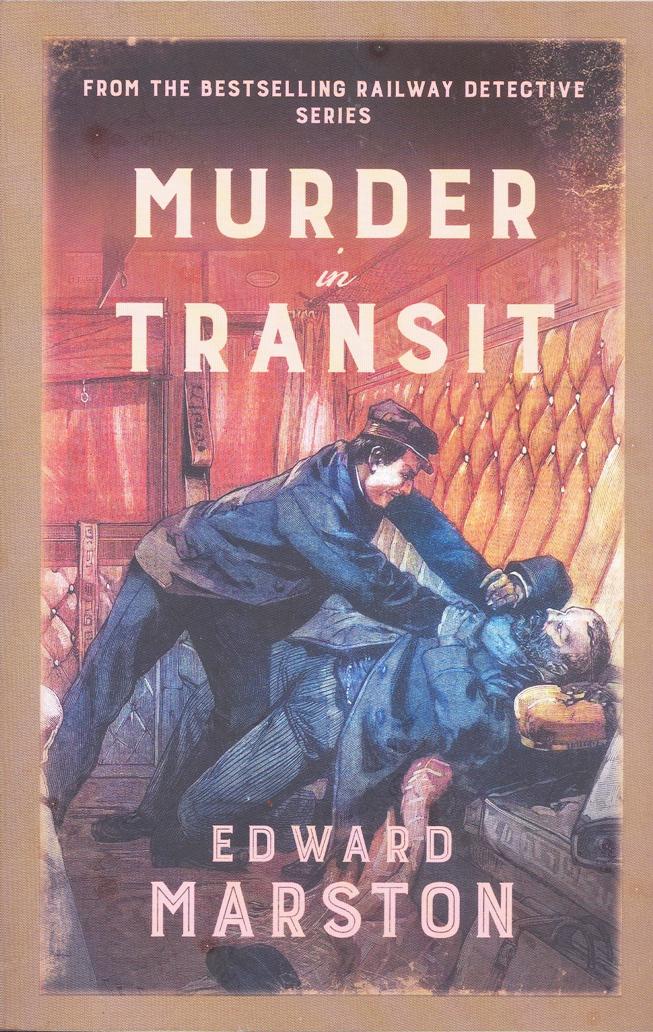
I read this book in June, 2025.
This is book 23 in he Railway Detective series by Edward Marston and featuring DI Robert Colbeck. This book is set in England in 1866. Of late I have been writing these comments under three headings - Characters, Private lives stories and Main plots :
Characters.
Inspector Robert Colbeck, the Railway Detective, is married to Madeleine (30s), and they have a young daughter Helena Rose (6). Madeleine is a gifted and successful artist of paintings with a railway theme.
Sergeant Victor Leeming is Robert's assistant. He is married to Estelle, and they have two sons, David, who works for LNWR as a cleaner, and Albert, still at school, initially wanted to be a policeman, but now wants to be a train driver.
Superintendent Edward Tallis is Robert's boss at Scotland Yard - ex military, served in India, and a strict disciplinarian.
DC Alan Hintorn, usually helps Robert and Victor.
Caleb Andrews, ex LNER, is Madeleine's now grumpy father.
Lydia Quayle is Madeleine's best friend.
Brendan Mulryne, is an ex London copper, Irish, super strong, and great in a fight.
New characters are :
Captian John Forrest is chief Constable of Hampshire and the Isle of Wight.
Superintendent Terence Vernon is chief of Portsmouth police.
Giles Blanchard, estate agent, adulterer, late 50s, is married to Catherine. He gets strangled on a train.
Paul Blanchard, is Giles's son - also an estate agent, is married to Verity (late 20s). They have twin 4 year old boys.
Agnes Lenham (30's) is the first blackmail victim. She is married to Crispin (70's).
Christina Falconbridge, married to Charles, is the second blackmail victim.
Emily Venn, married to Peter, is the third blackmail vicim.
Queen Victoria is in residence at Osborne House in the Isle of Wight.
Gwendoline Cardus is a lady companion to Q. Victoria and also a blackmail victim. Her mother Isobel lives on the Isle of Wight.
Berwyn Rees is an Isle of Wight estate agent who helps the police.
Douglas Collier (80) is Giles Blanchard's friend at the The Haven club in Chichester.
Lieutenent Luke Shorter is a naval contact.
Private Lives : There are few private lives changes. Robert is still happily married to Madeleine and they have an almost 6 year old daughter Helena Rose who now wants to be painter like her mother. They have a maidservant and nanny Hopkins (50's). Madeleine's dad Caleb Andrews is a frequent visitor - but as per the previous book, he is now a grumpy old man always complaining - "Robert shouldn't go away and leave you, Robert should solve his cases faster, Helena Rose's paintings are not very lifelike, etc."
Madeleine's best friend Lydia Quayle is also a frequent visitor. Her romance with DC Alan Hintorn is still glacially slow, but they now exchange messages saying they will miss each other.
Victor Leeming now bears the scars of a recent tussle with two ruffians - he has to leave interviews with the public to Alan Hintorn.
Main Plots.
It's Summer, 1866. A well dressed man enters a first class railway compartment where sits an attractive woman. A "drunk sailor" jumps in at the last minute, and falls asleep. The woman lets the man chat her up, kiss her and grope her, but when he pulls at her dress the sailor jumps up, and strangles the man. We will later learn that the man is Giles Blanchard, a wealthy estate agent married to Catherine and with a son Paul. Giles was a serial adulterer and has a black book listing the names and addresses of his numerous lady conquests. The attractive woman and the "sailor" are a team that usually distracts a male victim whilst the man pickpockets the victim's wallet. This time they have murdered someone, but have £100 in cash, a gold wedding ring, and an expensive pocket watch. They also have Giles's address book full of potential blackmail targets - "pay up, or we'll tell your husbands, family, etc."
The victim's body is discovered by a porter at Portsmouth station, and Captain Forrest, the Chief Constable of Hampshire calls in reinforcements. He contacts his ex army friend Superintendent Tallis of Scotland Yard, and Tallis sends the famous Railway Detective, and Leeming, and later Hintorn. They visit the widow, Mrs Blanchard. She is staying with her son Paul in a big country mansion on the Isle of Wight. Much later, Paul will gain access to his father's locked desk, and find a pile of explicit love letters addressed to Giles by various ladies. He reads them, is disgusted, and burns them. Later he will struggle to remember the names of the ladies when questioned by Colbeck.
The two, and later three detectives (Colbeck, Leeming and Hintorn) set to work. They interview various jewellers - asking "did someone sell a pocket watch and a gold ring ?" Eventually they strike lucky - a jeweller reports a "vicar" sold them this recently. Hintorn checks up on the vicar - he is not genuine, someone is playing the part. It seems the pair may be an actor and an actress ? Giles had spent a lot of time away from home at his club - The Haven, in Chichester - often staying overnight at his friend Collier's house. Interviewed, Mr Collier (80) says that Blanchard had free use of one of his spare bedrooms to entertain his young lady friends. It is this information that prompts questions about the state of Giles and Catherine's marriage. They had separate bedrooms. Paul Blanchard initially vigorously defends his father's honour, but after a lot of further questioning, he eventually tells the detectives about the love letters, and admits to burning them.
The murderer and his female accomplice have switched to blackmail per Giles's list of conquests. Three women are blackmailed - Ages Lenham, Christina Falconbridge, and residing on the Isle of Wight, Emily Venn. The set up is always the same - wait until the victim is alone, the female accomplice approaches, "we know about your friendship with Giles Blanchard, pay up or we'll disclose all and ruin your reputations and marriages". They all pay up, and will have to pay again next month,and the next, etc.
Everyone is very reluctant to co-operate - Paul to disclose his father's adultery, and the three blackmail victims to admit that they had been unfaithful to their husbands. But eventually the detectives do get co-operation. Happily, they also get other help. A lawyer says he saw the pair leave one railway carriage and get into another at Havant railway station. They meet Berwyn Rees, a rival estate agent on the Isle of Wight who is very helpful. They also meet an old friend Brendan Mulryne, an ex London copper and former circus worker, now working on the Isle of Wight ferry. They will call on his help at the climax. They also meet Nigel Buckmaster, the actor manager, and ask if he can suggest any likely rogue actors and actresses as possible blackmailers - and he can and does help.
I must mention one more blackmail victim - Gwendoline Cardus, a lady companion to Queen Victoria, then on holiday at Osborne House in the Isle of Wight. She had bought her mum a house on the island from Giles Blanchard and fallen under his spell. Of course, she too initially denies any liaisons with Paul, is shocked at the very idea, and sends them packing.
There is lot more to the story, but I'll leave you to read it yourselves and see how it works out. All in all, a nice little story, and a perfect evocation of England in the 1860's.
Links to author index and home page
| Edward Marston Heading | Author Index | Go to Home Page |